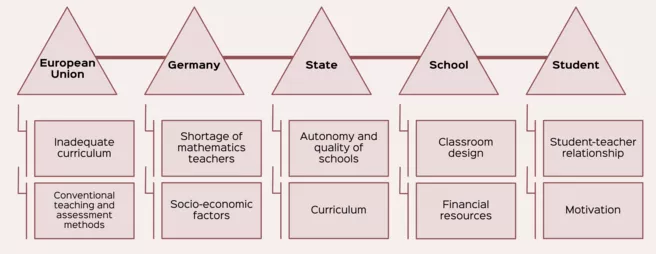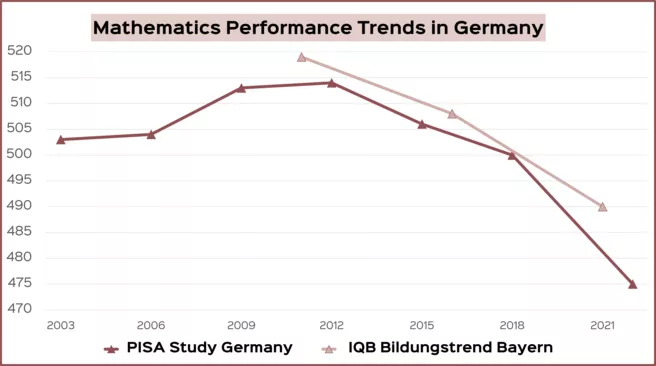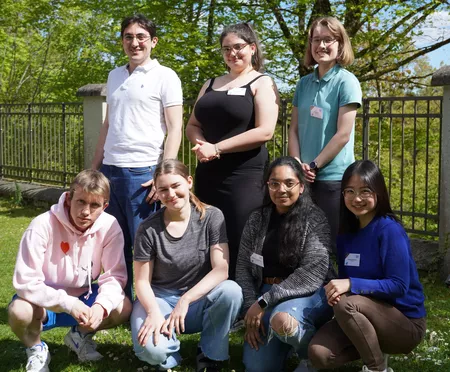Join us at the TUM Junge Akademie Symposium!
Let’s dive into PISA and math education in Germany.
Come and join us: Thursday, June 5th 2025 at TUM Audimax
About TUM: Junge Akademie
The TUM: Junge Akademie is a scholarship program for students from the Technical University of Munich who are interested in science and academia. Over a period of 20 months they work on their own research project in interdisciplinary teams, with the support of tutors and experienced experts.
About Us
Our shared interest in creativity and education has drawn our attention to the declining trend in the recent PISA results. We aim to address this issue on the different levels of teachers and students, in public discourse and research. We are further interested in how creativity can enhance mathematical performance.
Our Goal
Within the research project, we compare different perspectives on possible reasons for declining mathematical performance. We want to find out if the identified problems by experts and political institutions who are responsible for creating solutions align with the reality of affected students and teachers.

Methodology
Our project uses an exploratory approach with a focus on individual experiences and the opinions of policymakers, academics, teacher trainees, and students which is divided into three main phases:
Data Collection
Between October 2024 and January 2025, we conducted 28 semi-structured interviews with 13 students, 7 teachers in training, 5 scientists, and 3 politicians. Participants were recruited via events, our website, and direct outreach. Interviews, held in German or English either in person or via Zoom, focused on experiences with math education, teaching methods, curriculum, and policy. All participants provided written consent.
Data Analysis
Interviews were recorded, transcribed, and coded by a team of five using an inductive, grounded theory approach. Frequency analysis was used to evaluate the prominence of different topics, and the coding process was iteratively refined based on ongoing findings.
Data Interpretation
To compare and visualize stakeholder perspectives, we used situational mapping, which highlights claims, counterclaims, and justifications across groups. This approach enabled us to objectively map and compare the views of students, teachers, scientists, and policymakers, revealing key factors and differing opinions shaping mathematics education.
Results
All identified factors were categorized and presented in a situational mapping to make overlaps, gaps and connections visible.
Our interviewees identified problems such as outdated teaching methods, a lack of practical relevance and the pressure caused by overloaded curricula and staff shortages. Political actors, student teachers and academics were unanimous in their support for the use of digital tools, at least if they are pedagogically sound and targeted. Political actors and prospective teachers also criticized the current training of future teachers and the exclusion of teachers and scientists in the development of solutions.
Despite the complexity of the education system, our findings indicate a common understanding of the causes and possible solutions to the declining mathematics performance of students. Reasons for the persistent problems could be interactions between factors or low priority. As a result, despite widespread agreement, no sustainable solution has been achieved.
Team
| Abhirami Sreeprakash | (Technology of Biogenic Resources) |
| Bushra Demyati | (Civil Engineering) |
| Elke Haldmaier | (Sport Science) |
| Konstanze Maria Dietlmaier | (Health Science) |
| Lucia Arens | (Mathematics) |
| Marius Prock | (Biology) |
| Praissya Nathania | (Food Technology) |
Tutors | |
| Altan Birler | (PhD Student in Informatics) |
| Andrea Schittenhelm | (PhD Student in Sport Science) |
Supervisor | |
| Prof. Dr. Jörg Niewöhner | www.professoren.tum.de/niewoehner-joerg |


